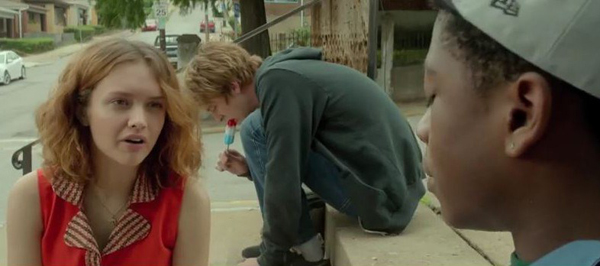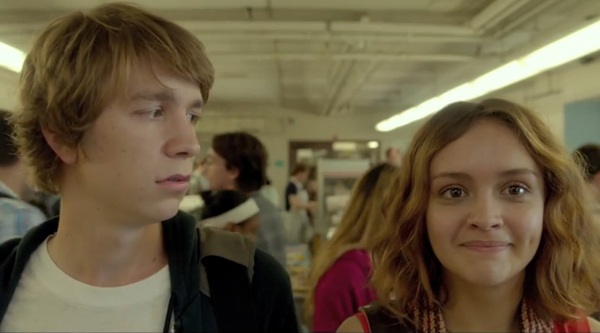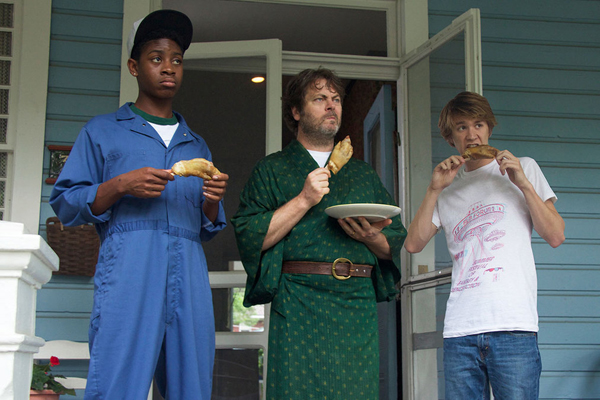Chicago Critics Film Festival: Me and Earl and the Dying Girl Review
Has the light-hearted coming-of-age cancer drama become a “thing?” In the wake of last summer’s superb young adult novel adaptation “The Fault in Our Stars,” a film like “Me and Earl and the Dying Girl,” also based on a novel (by Jesse Andrews, who adapted it for the screen) and also about two young people – one with late-stage cancer – forming a star-crossed relationship, appears to be a trend-riding copycat. It’s not.
Undeniably, “Me and Earl” shares DNA with John Green’s aforementioned book-turned-heart-tugging-teen-fiction phenomenon, but it turns out to be far less conventional, far more off-beat and equally as moving. And in a world with no shortage of contemporary coming-of-age films, it is – in spite of its premise – an absolute standout.
I was lucky to see “Me and Earl” at the Chicago Critics Film Festival, just its eighth screening since premiering at Sundance and scoring a well-deserved record-breaking distribution deal from Fox Searchlight. It won the Grand Jury Prize and Audience Award there as well, and no surprise there; it is limitlessly and unexpectedly funny, and when it’s not, it’s insightful and moving.
Thomas Mann stars as Greg Gaines, a high school senior in Pittsburgh who has spent his teenage years carefully arranging his life in order to stay off the radar and on everyone’s good side. When his parents (Connie Britton and Nick Offerman) force him to reach out to Rachel (Olivia Cooke), a classmate who has just been diagnosed with leukemia, Greg reluctantly obliges, and the friendship that develops soon begins to shake up his little world.
Narrator Greg reminds us often that this story is not a romance or anything else that we will undoubtedly expect it to be, and it’s true, and true of most other components of “Me and Earl” as a whole. The film never quite fits into the track marks of other high school-set films of its ilk, always remaining a hair different at the very least.
Part of the film’s unique stamp is its high-brow cinema appeal. Greg and his friend Earl (RJ Cyler) – or as Greg calls him, his “colleague” – make films together. Their projects are all inspired by classic films they like, only they butcher the title and make everything up from there. “Apocalypse Now,” for example, becomes “A Box of Lips, Wow.” Mann also does a wickedly funny Werner Herzog impression. The number of movie references (some more easily understandable than others) creates another connection to the audience and brings a certain tone of artistry that most teen dramas don’t often reach for.
The real artist, however, is director Alfonso Gomez-Rejon, who puts creative intention into every single shot in this film. For a director who didn’t also write the screenplay, Gomez-Rejon demonstrates an uncanny connection to Andrews’ story. Everything from duration of takes, to camera placement, to slow pans – Gomez-Rejon finds endless ways to enhance the core tenor or each scene without making it all seem disjointed. When the story is supposed to be funny, he maximizes the laughs, when it’s supposed to be sad, he lingers and lets the phenomenal performances from Mann and Cooke take center stage. For someone who got started on Ryan Murphy projects “Glee” and “American Horror Story,” Gomez-Rejon shows the level of skill that will quickly land him in big meetings discussing big projects, even if he ultimately should stick with indies.
We’ve seen so many films with structural similarities to “Me and Earl,” yet the sum of these pieces has a unique and powerful balance. Much of this can be attributed to the slight avoidance of clichés: the romantic chemistry between the leads is unpredictable; the relationship between the teens and their parents isn’t especially rife with tension, etc. – Jesse Andrews finds a way to tell a familiar tale in a way that is fine-tuned to the truth yet not duller because of it. You know a script is brilliantly done when a movie doesn’t get boring yet the only antagonist in the whole thing isn’t even a character – it’s cancer. That, and Greg’s inner turmoil. All the more reason, too, that Gomez-Rejon’s direction deserves equal acknowledgment; the camera is needed to create tension and conflict, not just to observe it.
The humorous packaging in which Andrews and Gomez-Rejon wrap the film also factors strongly into the product much like the way the then-fresh humor of “Juno” earned that indie a Best Picture nomination and Diablo Cody an Oscar. Original humor is exceedingly difficult to come by, and when it does, it acts as comfy pillows propping up a film. “Me and Earl” makes its bed this way, but then goes the extra mile with simple yet thought-provoking insight into life and death.
If ever there was an example to prove that a familiar premise can be explored through a different lens and deliver a different product and message, “Me and Earl and the Dying Girl” is it. Some subjects are just too vitally human to look at from one angle. Every person, or at least every creative, thoughtful mind, has something to contribute to life’s challenging and important lessons and moments.
5/5 Stars
Me and Earl and the Dying Girl
Directed by Alfonso Gomez-Rejon
Written by Jesse Andrews (novel, screenplay)
Starring: Thomas Mann, Olivia Cooke, RJ Cyler, Nick Offerman, Molly Shannon







0 Comments
You can be the first one to leave a comment.